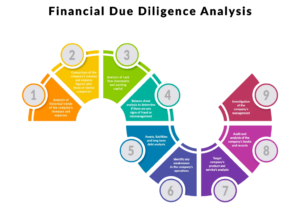Financial due diligence is a critical process undertaken by individuals, companies, or investors before entering into a financial transaction or business relationship. It involves a thorough investigation and analysis of the financial condition, performance, and risks associated with a potential investment, acquisition, or partnership. The objective of financial due diligence is to gather relevant information, assess the financial health and viability of the target entity, and identify any potential issues or red flags that may impact the decision-making process.

- Key components of financial due diligence include:
1.Financial Statements Analysis:
Reviewing the target company’s financial statements, including balance sheets, income statements, and cash flow statements, to assess its profitability, liquidity, solvency, and financial stability. Analysis of historical financial performance provides insights into trends, patterns, and potential areas of concern.
2.Quality of Earnings:
Evaluating the quality and sustainability of the target company’s earnings, revenue streams, and cash flows. This involves identifying any one-time or non-recurring items that may distort the financial picture and assessing the reliability of revenue recognition practices.
3.Asset and Liability Review:
Examining the composition and valuation of assets and liabilities on the target company’s balance sheet. This includes assessing the adequacy of asset valuation methods, the existence of any undisclosed liabilities or contingent obligations, and the overall asset quality.
4.Cash Flow Analysis:
Analyzing the target company’s cash flow dynamics, including operating, investing, and financing activities. Understanding the sources and uses of cash helps assess the company’s ability to generate sustainable cash flows, meet its financial obligations, and fund future growth initiatives.
5.Financial Ratios and Key Performance Indicators (KPIs):
Calculating and interpreting relevant financial ratios and KPIs to assess the target company’s financial health and performance relative to industry benchmarks and peers. Key ratios may include liquidity ratios, profitability ratios, leverage ratios, and efficiency ratios.
6.Risk Assessment:
Identifying and evaluating potential financial, operational, regulatory, and market risks associated with the target company. This involves assessing factors such as industry dynamics, competitive positioning, regulatory compliance, litigation exposure, and macroeconomic trends.
7.Management and Governance:
Assessing the quality and competence of the target company’s management team, governance structure, and internal controls environment. Understanding the capabilities and integrity of management is crucial for assessing the company’s ability to execute its business strategy and manage risks effectively.
8.Legal and Compliance Review:
Conducting a review of legal and regulatory matters, including contracts, agreements, licenses, permits, litigation, and regulatory filings. Identifying any legal or compliance issues helps mitigate potential liabilities and assesses the target company’s adherence to applicable laws and regulations.
9.Synergy and Value Creation:
Evaluating the potential synergies and value creation opportunities that may arise from the proposed transaction or partnership. Assessing strategic fit, market opportunities, cost savings, revenue enhancements, and other value drivers helps justify the investment thesis and assess the potential return on investment.
In conclusion, financial due diligence is a comprehensive and systematic process that involves assessing various financial, operational, and strategic aspects of a target entity. By conducting thorough due diligence, investors and decision-makers can make informed decisions, mitigate risks, and maximize the likelihood of a successful outcome in financial transactions and business relationships.